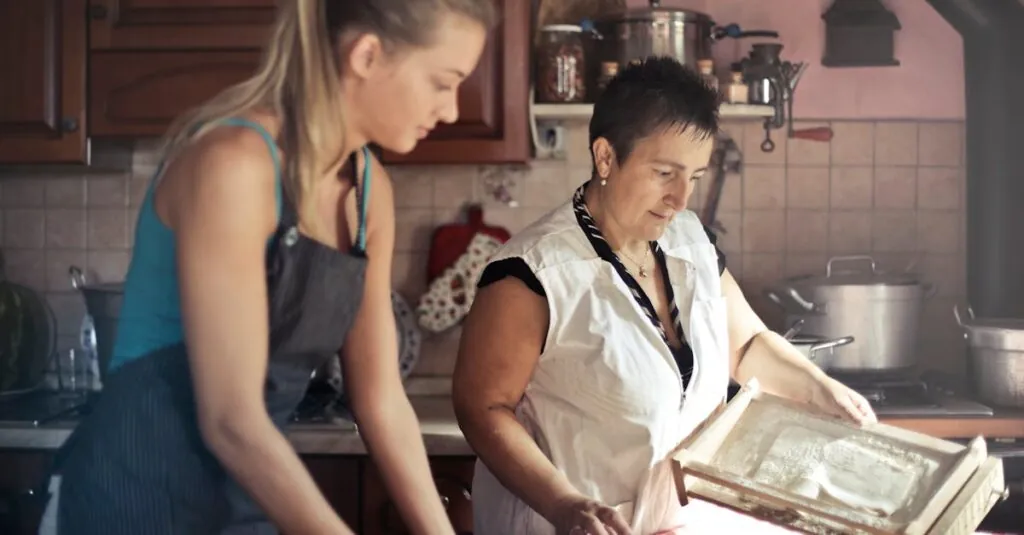Table of Contents
ToggleImagine whipping up a delicious meal while simultaneously sharpening your brainpower. Sounds like a dream, right? Cooking isn’t just about following recipes; it’s a fantastic opportunity to learn new skills and explore different cultures—all while avoiding the dreaded microwave meal. Whether you’re measuring ingredients or experimenting with flavors, every step in the kitchen can teach you something valuable.
Benefits of Learning While Cooking
Cooking serves as a platform for gaining valuable insights, skills, and experiences. This multifaceted activity not only leads to delicious meals but also promotes significant personal development.
Enhances Cognitive Skills
Cooking challenges the mind in various ways. Recipes often require precise measurements, which hones mathematical abilities. Memory plays a role when recalling ingredients and steps. Problem-solving occurs through adjustments in recipes, especially when faced with unexpected results. Engaging with new cuisines unlocks cultural knowledge, enriching the overall experience. Collaborating with others in the kitchen fosters teamwork and communication skills. Research indicates that these cognitive exercises provide mental stimulation, potentially benefiting overall brain health.
Develops Practical Life Skills
Cooking equips individuals with essential life skills. Meal planning teaches organizational abilities and time management. Preparing fresh meals encourages healthy eating habits, vital for physical well-being. Skills such as budgeting arise from shopping for ingredients, fostering financial literacy. Cooking also promotes independence, empowering individuals to make informed choices about their nutrition. Sharing meals enhances social interaction, strengthening bonds among family and friends. Overall, these practical skills contribute to self-sufficiency and improved quality of life.
Creative Learning Techniques
Cooking goes beyond meal preparation; it acts as a dynamic environment for learning. Various techniques enhance this experience, enriching both skills and knowledge.
Using Recipes as Educational Tools
Recipes serve as excellent educational tools. They present opportunities to practice reading comprehension, as individuals interpret steps and measurements. Additionally, recipe analysis fosters critical thinking, allowing cooks to determine necessary ingredient substitutions and modifications. Following a structured recipe improves attention to detail, honing focus and discipline. Engaging with different cuisines broadens cultural understanding, promoting appreciation for global flavors. Working through recipes encourages practical application of knowledge, making learning enjoyable and tangible.
Incorporating Science and Math
Cooking stimulates science and math learning seamlessly. Measuring ingredients illustrates mathematical concepts, including fractions and ratios. Temperature changes during cooking demonstrate scientific principles such as heat transfer and chemical reactions. Timing food preparation encourages understanding of time management and sequence. Experimenting with flavors involves hypothesis testing, encouraging cooks to predict ingredient interactions. Observing physical changes in ingredients during cooking fosters curiosity, linking cooking experiences to real-world scientific applications. Overall, integrating these subjects into the kitchen transforms culinary activities into powerful educational experiences.
Age-Appropriate Activities
Cooking provides opportunities for learning at different ages and skill levels. Engaging in age-appropriate activities fosters growth and enjoyment in the kitchen.
Cooking with Children
Cooking with children introduces essential skills in a playful manner. Kids learn to measure ingredients accurately, enhancing their math skills. Age-appropriate recipes, such as simple cookies or fruit salads, offer hands-on experience with mixing and blending. Following these recipes boosts reading comprehension and builds confidence. Moreover, children experience cause and effect by seeing how ingredients change during cooking. Encouraging collaboration with family members fosters teamwork and communication, making cooking a joyful group activity.
Engaging Teens in the Kitchen
Teens benefit from more complex cooking tasks that promote independence. Challenging recipes, like stir-fries or homemade pasta, enhance their cooking skills and boost creativity. Learning about nutrition assists them in making healthier meal choices. Teens can also explore international cuisines, deepening cultural understanding and broadening culinary horizons. Opportunities for meal planning and budgeting build practical life skills, preparing them for adulthood. Involving teens in cooking can create lasting family memories and discussions about healthy eating habits.
Resources for Learning While Cooking
Discovering resources for learning while cooking enhances the culinary experience. Various options exist to deepen knowledge and skills in the kitchen.
Books and Online Courses
Numerous cookbooks provide a wealth of information and diverse recipes. “The Joy of Cooking” remains a staple, offering step-by-step guidance for beginners. Online platforms, such as Coursera and Udemy, feature cooking courses that cover everything from basic techniques to advanced culinary arts. Participants can learn at their own pace while receiving videos and quizzes to track progress. Additionally, websites like MasterClass host lessons from renowned chefs, providing insights into professional cooking methods. These resources make it easy for aspiring cooks to gain knowledge and refine their skills.
Cooking Apps and Websites
Cooking apps create interactive experiences for users. Apps like Yummly and Tasty offer personalized recipe recommendations based on available ingredients. Websites such as AllRecipes and Epicurious provide thousands of user-generated recipes, alongside reviews and tips. Many of these platforms include instructional videos to guide through complex techniques. Users can explore various cuisines, ensuring a well-rounded culinary education. Furthermore, cooking apps often feature meal planning tools and nutritional information to support healthy eating habits. Engaging with these resources facilitates learning while enjoying the cooking process.
Cooking is more than just a daily chore; it’s a gateway to learning and personal growth. By engaging in culinary activities, individuals can develop essential skills while exploring diverse cultures and cuisines. The kitchen becomes a dynamic classroom where creativity flourishes and practical life skills are honed.
Whether it’s measuring ingredients or experimenting with flavors, every cooking experience offers valuable lessons that extend beyond the plate. Encouraging children and teens to participate in the kitchen not only fosters independence but also strengthens family bonds through shared experiences. With a wealth of resources available, anyone can embark on this enriching journey, transforming cooking into a powerful educational tool. Embracing the art of cooking ultimately leads to healthier choices and a deeper appreciation for food and culture.




